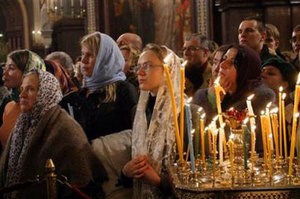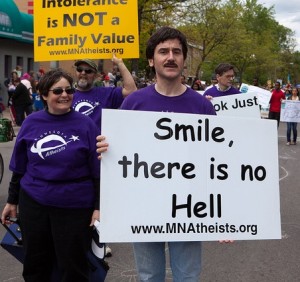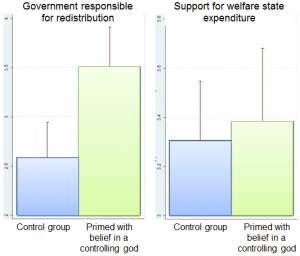As Europe staggers towards financial apocalypse, one question that’s almost certainly not in the minds of Merkel, Sarkozy, and Papandreou is what effect all the turmoil will have on people’s religious beliefs. After all, there’s been a bunch of research linking anxiety and insecurity to heightened religious beliefs, and earlier this year there was more evidence linking religion to economic insecurity.
But a lot of these studies have been pretty broad brush. They look at average conditions and average levels of religion among a wide basket of countries. Tim Immerzeel and Frank van Tubergen, at Utrecht University in the Netherlands, wanted to dig a little deeper (you might remember van Tubergen from an earlier study looking at income inequality and Church attendance).
They wanted to separate out the effects of an individual’s insecurity from the effects of simply living in a country which is, well, less secure. They wanted to separate out the effects of what has happened in the past, from the effects of the current situation. And they also wanted to separate out financial insecurity from existential insecurity (e.g threats to your life).
They did this by looking at the European Social Survey, which interviewed people in 32 European countries and Israel in several rounds from 2002-2009 (actually, they could only use data from 25 countries because several countries [Bulgaria, Cyprus, Croatia, Latvia, Portugal, Romania, and Ukraine] didn’t ask all the questions).
They found some interesting things. Firstly, people who are in good health are less religious – although they are more likely to attend Church (perhaps because it’s easier for them to get there). Widows and widowers are more religious (people who are divorced are the least religious, however).
People who have experienced war in the past, or the threat of terrorism now, are also more religious.
Financial security also matters, although here it gets a little bit complicated. People in stable employment now are less religious (as are educated people), suggesting that current financial security dampens enthusiasm for religion. However, people whose parents were unemployed when they were kids are actually less religious!
They also found a weak link between the strength of individual religious beliefs and the economic environment. In countries with a high unemployment rate, people were more likely to go to Church but were actually no more religious. Probably they go to Church as a kind of social insurance.
And, unlike what others have found, there was not really very much effect of social welfare spending on religion. No effect on religious beliefs, and only a marginal (negative) effect on Church attendance.
In fact, Immerzeel and van Tubergen found, in general, that the characteristics of the country didn’t have all that much effect on an individual’s religion – the individual’s specific personal circumstances was at least as important.
Now that might sound like a no-brainer, but in fact it differs from what other studies have suggested. In fact, it directly contradicts two studies from earlier this year. The first, from Ed Diener, showed that religion only improves well-being in tough societies. The second, from Frederick Solt and colleagues, found that in unequal countries both rich and poor are more religious.
Maybe that’s because Immerzeel and van Tubergen only looked at European countries (and the wealthier ones at that – remember they had to drop some of the poorer ones out). So all the countries were pretty similar, in terms of social insurance and income inequality. Maybe they didn’t find a difference simply because there weren’t all that many differences to find.
So, not a reason to throw out the idea that general economic malaise can make people less religious, but food for thought.
Their take home is that both economic and existential insecurity can increase religion. More importantly, perhaps, current financial insecurity can indeed lead to stronger religious fervour. Coupled with fertility and immigration trends, this is yet another sign that Europe’s secularisation may yet turn a corner.
![]()
Immerzeel, T., & van Tubergen, F. (2011). Religion as Reassurance? Testing the Insecurity Theory in 26 European Countries European Sociological Review DOI: 10.1093/esr/jcr072
 This article by Tom Rees was first published on Epiphenom. It is licensed under Creative Commons.
This article by Tom Rees was first published on Epiphenom. It is licensed under Creative Commons.















